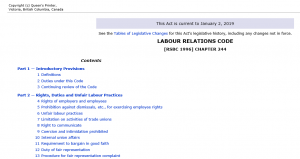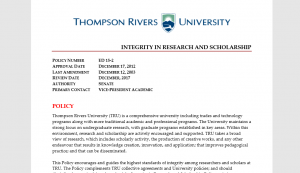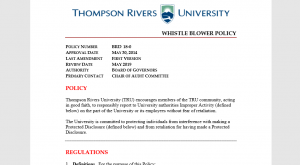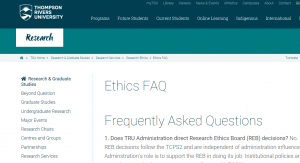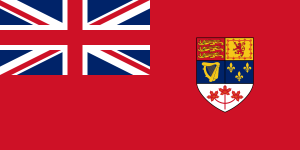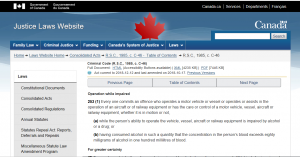
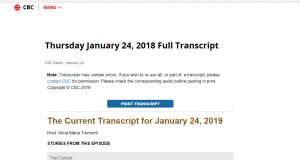
(Walls are pointless. Don’t even bother)
CBC, a.k.a The “Communist Broadbasting Corporation”, or the “Caliphate Broadcasting Corporation”, is a government funded “news” organization. It receives about $1.5 billion annually to spew out anti-Canadian stories. Taxpayers don’t get a say in the matter.
CLICK HERE, to reach the CBC Propaganda Masterlist. It is far from complete, but being added to regularly.
A lot to go through on this on.
CLICK HERE, for the article.
CLICK HERE, for the full transcript.
Quotes From The Transcript
AMT: Last week President Trump tweeted some statistics that he claims bolster his case. He wrote – and I’m quoting here – “There are now 77 major or significant was built around the world with 45 countries planning or building walls”. And then he continued: “The 800 miles of wars that have gone up in Europe since 2015 have been almost 100 percent successful.” Well as is usually the case for Donald Trump’s tweets some people took issue with those facts. What is true is that the United States is not the only country building walls and fences to protect its border.
Okay, are Trump’s facts wrong? Are border walls not going up across the globe?
SOUNDCLIP
[Music]
NEWSCASTER1: The race is on to get Hungary’s border fence ready by the end of month. It’s being built by prison inmates.
NEWSCASTER1: You’re still on Norwegian soil. Just over there. And you are in Russia. And while this fence is just a few hundred meters long, campaigners for refugees say it’s become something of a symbol of Norway’s changing attitudes.
NEWSCASTER2: The IDF is constantly improving its defensive capabilities. One of those being a wall being built between Lebanon and the 20 some Israeli communities adjacent to the border.
NEWSCASTER3: The King and county town of [unintelligible] clan elders say the border barrier has helped. This is what is meant to keep out Al Shabab fighters based in Somalia, part of a larger government project to protect the porous border
None of the examples cited here seem at all unreasonable. All are meant to reduce the flow of illegal immigration. “Illegal” immigration is something which globalists openly call for, since they don’t believe in sovereign nations.
“AMT: Well my next guest is someone who has studied many of the wars going up around the world right now. And Elisabeth Vallet fundamentally disagrees with Donald Trump. She says more walls are being built not because they work but in spite of the fact that they do not. Elisabeth Vallet is an adjunct professor and scientific director in geopolitics at the Raoul-Dandurand Chair at the University of Quebec at Montreal are and she joins us from Montreal. Hello.
.
AMT: What was your reaction when you saw Donald Trump tweeting those statistics about walls?
.
ELISABETH VALLET: I had seen statistics quoted by extreme right groups before and marginal blogs. I thought I would leave them alone since they didn’t need more exposure. But when the president did so, and argued that they were working, the fact that he was distorting my research really bothered me. And I thought that I had – not as an activist which I am not, but as a researcher – I had to set the record straight.”
Wanting to defend you borders and nation from massive amounts of illegal immigration is “far-right”? An issue that seems to be conflated here: Do you see border walls as 1/ immoral, or 2/ impractical? These are two very different arguments. And not an activist? Good to hear, but we will see.
“AMT: So can you break it down for me? How much of what Mr. Trump had to say was correct?
.
ELISABETH VALLET: So first of all he used the uproar that of our research. There are 77 walls that have been announced, are built so far credibly announced. And 70 of them have been built so far. And [unintelligible] countries have indeed built 70 border walls in the world. So that part was straight. The part about the 100 percent efficiency is that adequate, even in Europe. Because all those walls, some of them, are designed to prevent migration in Hungary are in Norway, but some of them are also designed to keep Russia at bay. This is in the Baltic states are Ukraine. So you’ve got different walls, different functions and in all cases what a wall does? Is a wall will redefine the geo-politics of the area and the geo-politics of the flows? So far while it may look like it is working, but actually it will just reroute and redefine the flows. Sometimes those flows that were taking place in the open will just be more underground, so more dangerous for the people that are trying to cross the border. But in the end they are not working. And this is why usually when you have a wall then you will have military deployed around the wall and technology and robots, drones and sensors. Because a wall per se doesn’t achieve anything apart from scarifying at the borderlands and ruining the local economies.”
We have different walls, different functions, and in all cases, what a wall does? Granted geo-politics differs form region to region. However, the function is the same: to prevent people from illegally crossing.
People will just go underground and it’s more dangerous? So what? You act as if illegal crossings and immigration are human rights.
Walls don’t achieve anything other scarifying at the borderlands and ruining local economies? Considering the amount of benefits that get paid out CLICK HERE, for one example, it could be argued that illegal immigration “strains” local economies.
And what about the rights of citizens to have an independent state and to not be forced to put up with illegal immigration? Do those voices not matter? Or are they all “far-right”?
“AMT: So can you give us an overview of some of the more significant walls that exist and are being built around the world?
.
ELISABETH VALLET: Well we could speak about countries that are literally fencing themselves and India is one of them. India has a huge fence with Pakistan, but of course with Bangladesh. They are actually fencing Bangladesh out of the peninsula. Of course you have the U.S. Mexican border which is fenced, walled on a third of the border. The one between Israel and the West Bank is also an interesting one. Israel was among those countries that is trying to fence itself, fortify itself literally. And then you will find other walls. You spoke about the one between Kenya Somalia. There is one between Botswana and Zimbabwe. Those in the Fergana Valley in Central Asia between China and North Korea. So you have those border walls across the world. A lot of them, the majority of them, has been built after 9/11 and a lot of them has been built after the Arab Spring.
.
AMT: So what do you see is driving the construction of those what?
.
ELISABETH VALLET: There are three reasons why you Bill borrow walls. Few of them now are being built for peace keeping, border enforcing reasons. It’s a way to end a conflict that has no end; between the two Koreas, between the Turkish and Greek part of Cyprus, in a way between India and Pakistan, Ukraine and Russia. Even between Israel and the West Bank it is a way to define a border that if we had a two state solution picking up that would be the final border. And then you have two reasons that dominates the discourse. One of them is smuggling and terrorism and the other one is migration. But those reasons sometimes alternate or overlap. So it’s pretty hard to distinguish them. So two third of them are built for that purpose. “
Walls are being built for peace keeping and border enforcement? Are those people far-right racists as well?
Smuggling and terrorism are 2 valid concerns? Agreed.
Sometimes for migration? Illegal immigration “is” a serious problem in the west. And if you make it a human right, then anyone can migrate. In fact, you acknowledge here that there is overlap between immigration, smuggling and terrorism.
You seem unaware that you are actually debunking your own arguments against walls.
“AMT: We all remember the Berlin Wall coming down. In fact it was 30 years ago this year. I’ve got a clip here that I’d like you to hear. These are two Germans talking about what it felt like to stand on top of the Berlin Wall after the crowds started streaming across the border.
.
AMT: Elisabeth Vallet, how did the fall of that iconic wall affect our ideas around the usefulness or function of walls?
.
ELISABETH VALLET: Well actually if you remember in 1989 it opened a almost a hippie era of international relations, where we believed that it was the end of borders me. Maybe even the end of state sovereignty or even the fading sovereignty of the state. We believed that peace would be dominating and that conflicts would be solved by the international community. It actually showed the good the positive aspects of globalization. And we overlooked the negative aspects of globalization. And when 9/11 arrived, it’s as if that negative aspect of globalization showed its face. And that’s when the only solution to that, governments came up with the one only solution which was building border fences, because there is no way to retain globalization, to contain globalization.”
This quote is so disingenuous that it needs to be called out all on its own. The Berlin Wall was put up in the 1960s by the Soviet Union to keep people in Berlin from leaving. To keep them prisoners. It was not about preventing illegal immigration “into” East Germany.
You thought that breaking down a wall imprisoning people would lead to the end of state sovereignty? You are delusional. Again, you conflate 2 completely different purposes.
Building border fences is the only way to contain globalism? You make that sound as if it’s a bad thing. It would only be bad if you believe nations shouldn’t have sovereignty.
“AMT: Donald Trump has talked about how he wants the border to be impenetrable. What do you think would happen if we had more rigid borders like that?
.
ELISABETH VALLET: Basically nothing because there is always a way to go around. You will see those pictures of ramps where you can drive cars to go over the U.S. Mexican wall which is huge. You will see drones going above. You will see even there is that one catapult that was actually fixed on the border wall to send drugs on the other side. They found a tunnel last week and through the city of Nogales. So there are always ways to go around. And one thing is, the wall doesn’t change a thing in the U.S. case since most of the trucks are coming into the U.S. through their regular ports of entry. So the world doesn’t help anything, doesn’t change anything. A border cannot be impenetrable. I would even say that a border is not meant to be that way.”
First, assuming everything she says is true, should a nation not “try” to defend its borders and independence just because people will try to sneak in? Border defence is difficult, so to heck with it, I suppose.
Second, she is not making a “moral” argument against border walls, but rather a “impracticality” argument. As outlined in earlier comments, she cites: 1/ open conflict; 2/ smuggling; 3/ terrorism, not to mention 4/ mass migration. All of the above are certainly valid reasons to invest heavily in border security.
There is another interview with a historian, David Frye, but compared to the first interview, there is little to criticise.
Overall though, it is interesting how often CBC has open-borders and illegal immigration supporters doing interviews. The globalist slant is very obvious here. Perhaps some balance, or at least provide tougher questions next time.


